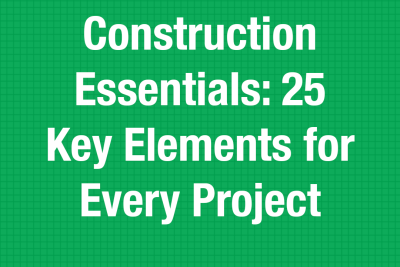
Construction Essentials: 25 Key Elements for Every Project
July 5, 2023
Construction Essentials: 25 Key Elements for Every Project
Navigating a construction project is complex but achievable. With these 25 key construction essentials, you will be able to have a smoother flowing construction project. As with any project, it’s important to do your research before starting. Construction projects are no different–if anything they are some of the most complex projects a person can take on. This has to do with the amount of people involved, the financial and time investments, and living with the end result. A happy client should always be top priority as construction essentials.
With that said, let’s dive into 25 key construction essentials to check off for your next construction project.
1. Comprehensive Planning:
A thorough plan forms the foundation of your project. It’s a construction essential and it should map out every aspect from design to completion. A solid plan guides your team, helps manage resources, and provides a framework for decision making. A common form of planning is to utilize a Gantt chart.
A Gantt chart will allow anyone to see the overall timeline of a project, including the individual sections, as well as who is in charge of each timeline.
2. Building Codes Compliance:
Number 2 on our list of construction essentials is ensuring your project abides by local building codes. These regulations maintain safety and functionality standards. Overlooking these can lead to legal ramifications and compromise the integrity of your project. It’s important to remember that each locality has their own unique codes. Make sure you use a builder that has worked in your area before.
Additionally it’s also possible to look up if your contractor / builder has done projects in your area by searching their Contractor License number. You can do so by going to CSLB.CA.Gov and entering their contractor number.
3. Required Permits:
Prior to construction, secure all necessary permits. Working without them can lead to penalties or project shutdown. Stay proactive and diligent to avoid these complications. All of your plans will need to be finalized before you can submit to the city. Expect at least 6 weeks for the city to approve permits. Sometimes this process can take longer, especially if the city come back with plan changes.
4. Detailed Budget:
Probably one of the most important aspects of a construction essential –a detailed budget. This keeps everyone honest and transparent. An accurate budget outlines the financial landscape of your project. It should encompass every cost, including materials, labor, permits, and a contingency fund for unexpected expenses. A well-structured budget can prevent cost overruns and financial stress.
5. Professional Estimator:
Consider bringing in a professional estimator as another. They can provide accurate cost estimates and identify potential areas of saving. Their expertise can protect your project from financial setbacks and improve efficiency.
More often than not, the construction company you go with will also do design and build. From here they will be able to give you a price estimate at the beginning. It’s also important to stay grounded and in-reality when describing your wants and needs. A good contracting company should be able to deliver you what you want and stay within your budget (within reason).
6. Qualified Team:
Your team can make or break your project. Assemble a skilled and experienced crew that aligns with your project’s needs. Remember, a reliable team is a worthwhile investment.
7. Project Manager:
A dedicated project manager can streamline your project. They’ll coordinate tasks, manage personnel, and keep the project on track. Their oversight can alleviate stress and increase productivity.
8. Clear Design:
Your design should be detailed and clear. It guides your team, aids in material procurement, and helps manage client expectations. A solid design also reduces the chances of costly mid-project changes.
9. Quality Materials:
The quality of your materials directly impacts the end product. Invest in high-quality materials for a durable, aesthetically pleasing result. Remember, compromising on materials can lead to future repair costs and safety risks.
10. Appropriate Equipment:
Every task requires specific equipment. Ensure you have the correct equipment ready, whether it’s for digging, lifting, or building. This can increase efficiency and reduce the risk of accidents.
11. Safety Precautions:
Safety should never be compromised. Equip your team with personal protective gear and conduct regular safety training. Implement safe work practices to create a secure environment for everyone on site.
12. Quality Control Measures:
Implementing a robust quality control system ensures that every stage of work meets set standards. Regular inspections, quality checks, and a feedback mechanism are essential components. Prioritize quality to avoid substandard work and future complications.
13. Timeline:
A clear, realistic timeline is key to project management. It should highlight milestones and keep track of progress. A well-defined timeline can prevent delays and help manage resources efficiently.
14. Site Evaluation:
Understanding your site is crucial before starting construction. A comprehensive site evaluation can reveal potential issues such as soil type, water table level, and property lines. This information can guide your design and construction strategy.
15. Communication Strategy:
Clear, timely communication can prevent misunderstandings and ensure alignment. Establish effective channels for regular updates, feedback, and issue resolution. Regular meetings and progress reports can keep everyone informed and engaged.
16. Contract Agreement:
Protect your interests with a well-drafted contract. It should clarify roles, responsibilities, payment terms, and dispute resolution procedures. A clear contract can prevent disputes and ensure smooth collaboration.
17. Environmental Considerations:
Sustainable construction is increasingly important. Aim to minimize environmental impact by using eco-friendly materials, managing waste responsibly, and optimizing energy use. Your commitment to sustainability can also enhance your project’s reputation.
18. Risk Management Plan:
Every project comes with potential risks. Identify these risks early and develop strategies to mitigate them. A sound risk management plan can prevent disruptions and keep your project on track. Always planning for errors can quickly become construction essentials.
19. Contingency Plan:
Despite the best planning, unforeseen circumstances can arise. Develop a robust contingency plan to handle such situations. This ensures that your project can weather unexpected setbacks without compromising on the timeline or quality.
20. Subcontractor Selection:
If your project requires subcontractors, choose them carefully. Review their expertise, reliability, and past projects. A well-chosen subcontractor can bring invaluable skills to your project, ensuring it meets your standards.
21. Regular Inspections:
Conducting regular site inspections can ensure work safety and quality. These construction essentials checks allow you to address issues immediately, preventing them from escalating. Remember, consistent oversight is key to maintaining high standards.
22. Progress Documentation:
Keep detailed records of the project progress. Documentation provides a reference for future projects, aids in dispute resolution, and keeps everyone accountable. Ensure to record changes, decisions, and important discussions.
23. Change Order Process:
Changes are a common part of any project. Develop a system to handle change requests effectively, keeping the project on track. Transparency in the change order process can prevent confusion and conflict.
24. Final Inspection:
Before declaring your project complete, conduct a thorough final inspection. This ensures every aspect of the project is complete, functional, and up to standards. Any issues identified can be rectified before the project’s closure.
25. Project Review:
Once the project is complete, review it comprehensively. Evaluate what went well and areas that need improvement. These insights are invaluable for refining processes and strategies for future projects.
Incorporating these 25 construction essentials will guide you towards a successful construction project. From comprehensive planning and maintaining safety precautions to conducting a final project review, every step is vital. With diligent attention to these aspects, you’re well on your way to a successful project outcome. Best of luck!
Further Reading and Resources
To delve deeper into sustainable construction, we recommend these excellent resources from Greenworks Construction. These comprehensive guides provide invaluable insights and expert knowledge on a wide range of topics related to home construction, remodeling, and sustainability.
Accessory Dwelling Unit Design
Want to understand more about designing an accessory dwelling unit? Read this guide.
Home Building Costs in Los Angeles
For insights into the costs associated with home building in Los Angeles, check out this resource.
Kitchen and Bathroom Remodel
Discover the intricacies of kitchen and bathroom remodels with this informative article.
Building Permit Requirements in Los Angeles
Familiarize yourself with Los Angeles building permit requirements with this comprehensive guide.
Earthquake Retrofitting in Los Angeles
Learn about the importance and process of earthquake retrofitting in Los Angeles in this detailed guide.
Accessory Dwelling Unit Permits in Los Angeles
Understand the process for securing an accessory dwelling unit permit in Los Angeles by reading this resource.
Kitchen Remodel Design Choices
Explore the possibilities for your kitchen remodel with this article on design choices.
Backyard Remodel in Los Angeles
Thinking about a backyard remodel in Los Angeles? This guide has all the information you need.
Garage Conversions in Los Angeles
Transform your garage into a functional living space with this guide on garage conversions.


